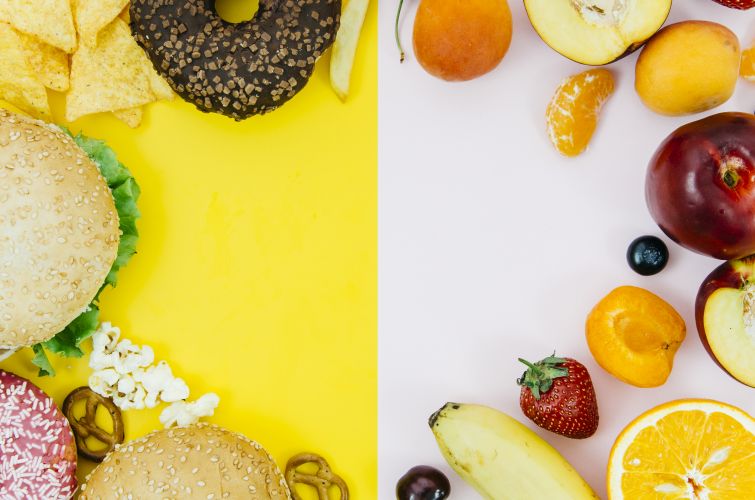People who follow a low-fibre diet or lead a non-active lifestyle commonly get hemorrhoids. Such a combination often leads to chronic constipation, one of the critical causes of the ailment.
Some estimates suggest that around 75% of adults, especially those over 60, get hemorrhoids at some point in their life. However, several well-known ways exist to prevent hemorrhoids and avoid the associated discomfort and pain.
Following a balanced nutrition or dietary plan is essential to preventing hemorrhoids or mitigating their effects.
What are hemorrhoids?
Hemorrhoids (or, as they are commonly known, “piles”) occur when veins in the rectum and anus area become swollen and inflamed. Hemorrhoids can happen for various reasons, including sitting on the toilet for a long time, straining to force a bowel movement, lifting heavy objects or being pregnant.
How does your diet affect hemorrhoids?
As you might expect, the type of food you eat is essential to preventing or getting diet-related hemorrhoids. A vital component of a balanced diet is fibre which helps prevent hemorrhoids. If you already have hemorrhoids, you must change your diet and ensure a higher intake of high-fibre foods such as vegetables and whole grains.
How does fibre help hemorrhoids?
Eating a balanced, fibre-rich diet is one of the most effective changes you can make to your dietary lifestyle to prevent or mitigate the effects of hemorrhoids.
Fibre adds bulk to and softens your stool, moving it through the colon faster. Accordingly, hemorrhoids are less likely to flare up, or the veins around the anus become enlarged due to straining when trying to force the stool. Fibre also absorbs water, so stools are less “sticky” and do not cause hemorrhoids or constipation.
There are two types of fibre: soluble fibre, which dissolves in water to form a glue-like substance and helps make your stool well-formed and soft and, therefore, easy to pass.
The second is insoluble fibre which doesn’t dissolve and is sometimes called “roughage.” Insoluble fibre helps keep digested food moving through your system and balance the chemistry in your intestines.
As many “high-fibre” foods have soluble and insoluble fibre, it’s possible to identify the best foods to help prevent hemorrhoids and the types of food to avoid.
So, what are the best choices of food to prevent hemorrhoids?
Since there is so much variety of food to eat, the choices can be bewildering. But here are basics about which foods you’ll want to eat more often if you want to keep hemorrhoids from occurring or re-occurring—and, of course, some of the foods to avoid:
Fruit and vegetables
Apples, plums and pears are good for hemorrhoids, especially when eaten with intact skins. There’s a high percentage of insoluble fibre and flavonoids (compounds which can help control hemorrhoid bleeding) in these skins.
Other fruit rich in flavonoids, including grapes or berries, are also very good, and it’s best to eat such produce whole and fresh. Avoid damaging the skins or leaves until they’re ready to be eaten.
Dried fruits such as figs, apricots or dates make great snacks to help prevent hemorrhoids.
An average serving of fruit provides at least 10% of daily fibre needs.
Vegetables
Many vegetables’ leaves, stalks and roots have large amounts of fibre. Some of the best high-fibre options are green peas, broccoli, sprouts (and other dark leafy greens), parsnips, and carrots. You can add in tomatoes, cucumber peels and potato skins too.
Certain vegetables and fruits such as cucumbers, celery, bell peppers and watermelon comprise more than 90% water and have a high fibre content.
Grains
Certain fibre-rich whole grains such as quinoa, rye, brown rice and buckwheat will help improve your intake of the amount of insoluble fibre you need, as will cooked oats and barley.
Butter-free popcorn is also perfect for a high-fibre diet. Salads and soups can be sprinkled with oat bran or wheat germ to improve fibre intake.
Seeds
Chia, ground flax seeds and psyllium are amongst the best options for seeds as a reliable source of fibre. They can be sprinkled on top of salads, smoothies, or even yogurt. Yogurt with probiotics can give an extra digestive system booster.
Nuts, beans and lentils (the “legume” family)
Nuts have strong anti-inflammatory properties, which can minimize tissue swelling in the anal area(s) likely to have problems with hemorrhoids.
Walnuts and almonds are exceptionally high in fibre, as are pistachios, hazelnuts, peanuts, pecans and macadamias.
Half a cup of kidney, navy, lima or black beans will provide about 33% of your required daily intake and produce between 7-10 grams of fibre (both soluble and insoluble), depending on which type of beans you choose.
Top foods to avoid to prevent or mitigate hemorrhoids
Constipation can result from eating foods with little fibre, causing or making hemorrhoids worse.
It’s, therefore, best to limit how much of the following you eat:
- white bread, buns and bagels;
- milk, cheese, and other dairy products;
- all and any sort of meat;
- processed foods such as frozen meals, sandwich meat, pizza, frozen meals, and ubiquitous fast foods.
N.A. Hemorrhoids Clinic can help
Research has proven that the food and beverages you consume can significantly impact your health, and what you eat and drink directly influences the types of stools you produce.
With the onset of hemorrhoids directly linked to the nature of your stools, maintaining a balanced diet with plenty of fruit and vegetables, drinking plenty of water and doing appropriate exercise can help prevent hemorrhoids.
In any event, it’s essential to seek specialist advice. At N.A. Hemorrhoids Clinic, our specialists can help you treat your hemorrhoids and manage the painful symptoms.
Our Clinic uses widely acclaimed traditional Chinese medicine methods, including a herbal ointment called “Ba Zhi San,” combined with modern and other naturopathic methods to treat hemorrhoids effectively.
So, why not contact us now and let us help you prevent hemorrhoids or get over the problems associated with them?


